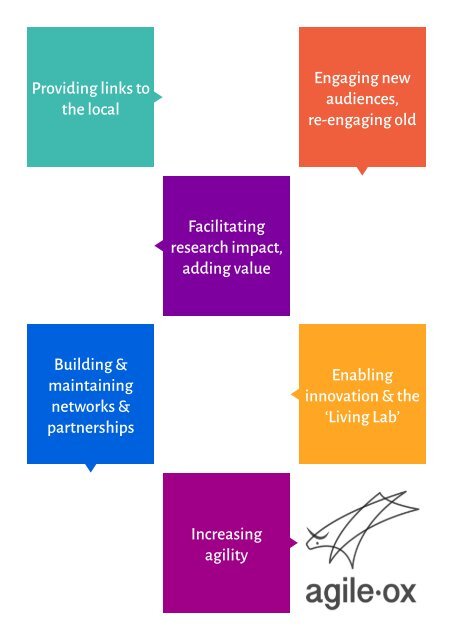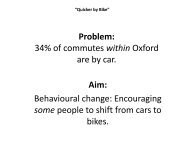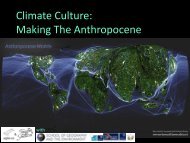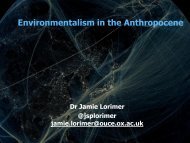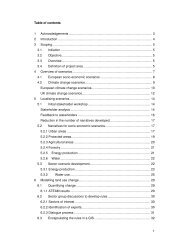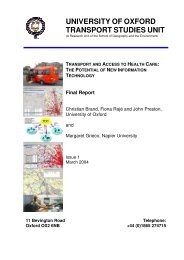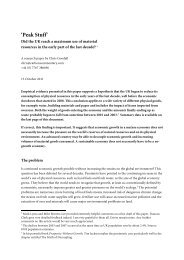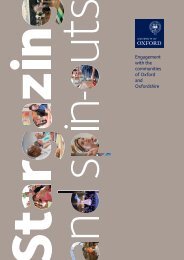agile-ox Overview Summer 2016
You also want an ePaper? Increase the reach of your titles
YUMPU automatically turns print PDFs into web optimized ePapers that Google loves.
Providing links to<br />
the local<br />
Engaging new<br />
audiences,<br />
re-engaging old<br />
Facilitating<br />
research impact,<br />
adding value<br />
Building &<br />
maintaining<br />
networks &<br />
partnerships<br />
Enabling<br />
innovation & the<br />
‘Living Lab’<br />
Increasing<br />
agility
Introduction<br />
Halfway through its second year, the <strong>agile</strong>-<strong>ox</strong> local engagement and knowledge<br />
exchange project is quickly gaining visibility and momentum.<br />
The project has a series of successful experimental events and engagement activities<br />
under its belt, and an ever-growing and engaged network at its fingertips, stretching<br />
across Oxfordshire and beyond.<br />
With its understanding of local priorities and University expertise, <strong>agile</strong>-<strong>ox</strong> is perfectly<br />
placed to connect the University’s research with local opportunities, building<br />
partnerships and facilitating impact, and working to maximise our contribution to the<br />
county’s environmental futures.<br />
<strong>agile</strong>-<strong>ox</strong> is adding value to the University’s environmental research and networks,<br />
identifying opportunities for new collaboration and research, and ensuring the<br />
University is an important player in our ‘<strong>agile</strong>’ future, both locally and globally.<br />
The following document outlines the strategic value of the project, highlighting some<br />
of its successes to date.<br />
Mim Saxl, Project Coordinator, <strong>agile</strong>-<strong>ox</strong><br />
Match<br />
Funding Needed<br />
<strong>agile</strong>-<strong>ox</strong> is currently funded<br />
by the Patsy Wood Trust, and<br />
has been offered additional funding<br />
for next year and beyond, if match<br />
funding can be found. For this funding<br />
to be unlocked and for the project to<br />
continue, match funding must be<br />
obtained by September <strong>2016</strong>.<br />
“<br />
Oxford University has huge, and largely untapped, potential to help the people of<br />
Oxford and Oxfordshire address sustainability challenges, like flooding, clean energy<br />
and food security [...] <strong>agile</strong>-<strong>ox</strong> is connecting the University’s world-leading expertise<br />
with local government, businesses, NGOs and people.<br />
Professor Jim Hall, Director of the ECI, University of Oxford<br />
“
Providing links to the local<br />
In a world where the local agenda is growing in importance, and local action is seen<br />
as a crucial part of responding to some of the biggest challenges we face, <strong>agile</strong>-<strong>ox</strong> is<br />
providing a key link to the local.<br />
The project is mapping Oxfordshire’s ‘hot topics’ and linking them to the University’s<br />
current research, creating benefits for both the University and Oxfordshire’s decisionmakers<br />
and innovators.<br />
Tuned into the needs and priorities of local decision makers, businesses, researchers<br />
and the wider community, <strong>agile</strong>-<strong>ox</strong> enables the University to take full advantage of<br />
local opportunities and capability, and provides a gateway to the local for University<br />
researchers.<br />
With <strong>agile</strong>-<strong>ox</strong>’s broad knowledge of University priorities and research, and through<br />
its fast-growing network, the project is enabling Oxfordshire’s environmental<br />
stakeholders to take full advantage of the University’s largely untapped expertise.<br />
By showcasing cutting edge research and public engagement activities, it raises local<br />
awareness, facilitating joined-up thinking and creating new beneficial partnerships.<br />
“<br />
<strong>agile</strong>-<strong>ox</strong> is a key mechanism in ensuring that we<br />
can better connect with groups and companies on<br />
our doorstep to make sure they can take advantage<br />
of our network and inform the work that we do.<br />
“<br />
Dr Pete Walton, Oxford Climate Research Network,<br />
University of Oxford<br />
“<br />
The <strong>agile</strong>-<strong>ox</strong> project is extremely valuable in<br />
providing a ‘way in’ to the University [...] it’s fantastic<br />
to have this resource connecting the University<br />
academics with local communities, public sector<br />
and businesses.<br />
“<br />
Jenny Carr, Low Carbon Oxford, Oxford City Council
<strong>agile</strong>-<strong>ox</strong> engagement to date<br />
OU RESEARCH<br />
COMMUNITY<br />
INFORMATION &<br />
RESEARCH<br />
CIRCULATING<br />
WORKING WITH<br />
OTHER OU KE<br />
50+ OXFORDSHIRE STAKEHOLDERS<br />
LINKED INTO AGILE-OX
Increasing agility<br />
In January <strong>2016</strong>, in her admission address, the new Vice-Chancellor, Professor Louise<br />
Richardson, called for a fast-moving and ‘<strong>agile</strong>’ University at the forefront of global<br />
change. She asked, “how do we ensure that we organise ourselves to respond with<br />
agility to opportunities as they arise?”<br />
The wide subject and stakeholder remit of <strong>agile</strong>-<strong>ox</strong> allows the University and County’s<br />
key stakeholders to be increasingly <strong>agile</strong>, enabling us all to respond creatively,<br />
efficiently and effectively to the complex environmental and social challenges we<br />
face.<br />
The project’s breadth of scope acknowledges and mirrors the real-world complexity,<br />
interconnectedness and interdisciplinarity of these challenges, and is in line with<br />
current nexus research thinking.<br />
Environmental Challenges & Digital Technology workshop, June 2015:<br />
• Fifty individuals from research (eight University of Oxford Departments), public<br />
sector and business, brought together for a half-day networking workshop<br />
• Led directly to new ‘Resilient Oxford’ workshop and City Council-led Rockerfeller<br />
Institute bid for new Resilience Officer post<br />
• Prime example of area which does not slot neatly into one subject category<br />
research-wise, but which is key to thinking about Oxfordshire’s future, and a priority<br />
for local Councils and SMART Oxford<br />
• Creation of this interdisciplinary network increased agility and ability of county<br />
to respond to funding opportunity<br />
“<br />
<strong>agile</strong>-<strong>ox</strong>’s workshop [...] was a valuable forum to<br />
present the Smart Oxford initiative, and provided<br />
helpful feedback from the wider business, academic<br />
and civic community on the environmental<br />
challenges and opportunities facing the city [...] The<br />
network connections that it facilitated were also<br />
useful in feeding into further local events<br />
“<br />
Bill Imlah, Digital Research & Collaboration Officer,<br />
Knowledge Exchange and Impact Team; Smart Oxford<br />
Board
Engaging new audiences, re-engaging old<br />
<strong>agile</strong>-<strong>ox</strong> is developing creative methods of engagement, trailling new approaches<br />
and building engagement expertise across the research community.<br />
Through its blog posts, social media presence and events, the project is developing<br />
new ways to communicate often complex ideas in engaging and accessible ways,<br />
to a wide range of local audiences. Through its networks, it is enabling the University<br />
research community to take advantage of the many local opportunities for showcasing<br />
research.<br />
The <strong>agile</strong>-<strong>ox</strong> project is on hand to facilitate engagement on behalf of the wide<br />
range of cutting edge and locally relevant research happening at the University,<br />
and is proactive in sharing expertise and contacts with others in Oxfordshire’s<br />
environmental community and supporting wider engagement efforts.<br />
Oxfordshire: Welcome to the Anthropocene:<br />
• Series of events and activities to engage Oxfordshire with current thinking<br />
around the concept of the Anthropocene<br />
• Activities included: online survey; Anthropocene-focused web content; article<br />
in InTandem Magazine and a well-attended and controversial Ecomodernism debate<br />
with Mark Lynas in partnership with OCTF<br />
• Project culminated in ‘Climate Culture: Making the Anthropocene’, an evening<br />
event with short talks from researchers, a collaborative installation from local artists<br />
(including two new pieces of poetry) and the opportunity for attendees to participate<br />
in an Anthropocene-inspired interactive sound workshop with composer Toby Young<br />
“<br />
As a researcher and practitioner with an interest<br />
in public understanding of climate science through<br />
art, I feel that <strong>agile</strong>-<strong>ox</strong>’s model is a highly effective<br />
one, with huge potential for growth and even wider<br />
impact in the local area.<br />
“<br />
Dr Toby Young, composer & Oxford University Faculty of<br />
Music
Facilitating research impact, adding value<br />
<strong>agile</strong>-<strong>ox</strong> has built up extensive knowledge, networks and expertise, positioning it to<br />
add value to the plethora of locally focussed and locally relevant University research.<br />
Whether researchers want help with identifying participants, testbeds for research,<br />
opportunities for funding and collaboration, or identifying and creating new and<br />
interesting pathways to impact, <strong>agile</strong>-<strong>ox</strong> is on hand to help.<br />
The project adds value to existing University initiatives, for example playing a key role<br />
within the Oxford Networks for the Environment, by facilitating shared events and<br />
providing access to an extensive local network and eager audiences.<br />
ECI-based research project METER:<br />
• Working closely with EPSRC fellow Dr Philipp Grunewald to support research<br />
project METER, ‘Measuring and Evaluating Time- and Energy-use Relationships’<br />
• Support includes help with recruiting 500 participants needed for research,<br />
identifying opportunities to access and engage new local audiences<br />
• Working to develop innovative role-playing game, ‘Power Struggle Neighbours’,<br />
to happen as part of Low Carbon Oxford Week <strong>2016</strong><br />
• This event will simultaneously raise the profile of the research project and encourage<br />
participantion, allow Dr Grunewald to test new ideas and a new engagement<br />
tool, whilst also celebrating and increasing awareness of the Oxford Energy Network<br />
and ECI’s 25th Anniversary, amongst key local stakeholders<br />
“<br />
The events put on by <strong>agile</strong>-<strong>ox</strong>, and Mim Saxl’s<br />
engaging manner in particular, have created<br />
valuable contacts with local businesses and<br />
stakeholders, which have had a positive impact on<br />
my own research and that of my colleagues.<br />
“<br />
Dr Philipp Grunewald, FICE, EPSRC Fellow, Deputy<br />
Director of Energy Research, University of Oxford
Building & maintaining networks & partnerships<br />
<strong>agile</strong>-<strong>ox</strong> plays an important role in relationship management, both internally<br />
and externally, building new networks and partnerships with Oxfordshire’s<br />
stakeholders, and strengthening existing links.<br />
The project’s extensive networks allow the University to spot interesting opportunities<br />
for synergy and creative collaboration, and also builds capacity and knowledge, so<br />
when an opportunity arises, the University is poised to take advantage rapidly.<br />
<strong>agile</strong>-<strong>ox</strong> is recognised by many as both a gateway into and out of the University,<br />
and it is playing an important role in persuading both ‘town’ and ‘gown’ of the value<br />
of collaboration.<br />
Ongoing relationship with key local stakeholder Good Food Oxford:<br />
• Participatory role in governance and direction of Good Food Oxford, Oxford’s<br />
sustainable food network, through inclusion in Steering Group<br />
• Series of joint ‘Research Kitchen’ events, showcasing the University’s hottest new<br />
food-relevant research, increasing engagement and collaboration<br />
• Upcoming food scenarios workshop, the result of a Research Kitchen event, with<br />
buy-in from ten key stakeholders<br />
• Brought Good Food Oxford and local stakeholders into new food research<br />
projects at the ECI<br />
• Provided free office space to Good Food Oxford for two six-week periods in 2015-<br />
16, during periods of low occupancy<br />
“<br />
By facilitating conversations and connections,<br />
<strong>agile</strong>-<strong>ox</strong> has played a critical part in allowing<br />
Oxford’s sustainable food network to integrate<br />
its activities with the latest food systems thinking<br />
at the ECI. And in turn, Good Food Oxford is now<br />
feeding in local knowledge to help shape applied<br />
ECI research in the future.<br />
“<br />
Hannah Fenton, Good Food Oxford
Enabling innovation & the ‘Living Lab’<br />
<strong>agile</strong>-<strong>ox</strong> promotes the value of Oxfordshire as a testbed for innovative research.<br />
The project is well-placed to identify opportunities for local testing of research, and<br />
plays an active matchmaking role between research and action, developing new<br />
partnerships for innovation.<br />
<strong>agile</strong>-<strong>ox</strong> is actively engaged in the process of idea creation, for example running<br />
hackathons to develop new solutions to the County’s current problems, and facilitating<br />
the local trial of resulting prototypes.<br />
Pedalling Innovation, Oxford’s First Cycling Data Hackathon, February <strong>2016</strong>:<br />
• Designed to generate ideas and solutions to support the University’s Transport<br />
Strategy and tackle challenges to cycling in Oxford city<br />
• Held in partnership with Oxford University Estates in collaboration with SMART<br />
Oxford, the Broken Spoke Bike Co-op, MobOx and Oxford University’s Transport<br />
Studies Unit, with active involvement from both Oxfordshire County Council and<br />
Oxford City Council<br />
• Hack generated 6 ideas, all of which have follow-on development support from<br />
key stakeholders, including Oxfordshire County Council and Oxford University Estates.<br />
“[This] generated a huge amount of energy for<br />
using Oxford as a living lab [...] <strong>agile</strong>-<strong>ox</strong> surpassed<br />
all expectations and enabled us to engage with a<br />
range of key stakeholders whilst crucially allowing<br />
the disruption necessary to break with conventional<br />
thinking and innovate. Quite simply we could not<br />
have done this without the advice, expertise and<br />
knowledge of <strong>agile</strong>-<strong>ox</strong>.<br />
“<br />
Adam Bows, Sustainable Transport Manager, University<br />
of Oxford
Support for <strong>agile</strong>-<strong>ox</strong><br />
“I have found working with Mim and the <strong>agile</strong>-<strong>ox</strong> project very helpful indeed for our<br />
efforts to foster a functioning locally-focussed Enterprise culture between different<br />
groups within the university and with local businesses and policy makers. Her support<br />
has been essential for the development of Low carbon and other environmental<br />
initiatives, and with getting a programme of hackathons and similar events going<br />
to build that collaborative dimension. Without Mim’s enthusiasm and expertise in<br />
drawing people together we would be struggling to get strong support across the<br />
university. We are currently working together very successfully in delivering several<br />
outward facing activities that demonstrate the impact that the university has locally,<br />
and with the impact agenda rising, to lose Mim and <strong>agile</strong>-<strong>ox</strong> at this point would set<br />
us back a long way.”<br />
Dr Anne Miller, Enterprise Programme, Mathematical, Physical & Life Sciences, Oxford<br />
University<br />
“<strong>agile</strong>-<strong>ox</strong>/Mim is proving an invaluable resource. She has facilitated an increasing<br />
number of linkages, interactions and shared learning events between academics and<br />
local people which helps inform and strengthen local action on climate change and<br />
other environmental issues, as well providing feedback and new ideas for academic<br />
research. She has facilitated a number of extremely interesting and useful events<br />
the most notable of which recently was on air quality with academic experts, local<br />
council, Friends of the Earth and local community groups. The number and range<br />
of interactions between academics and local organisations appears to be widening<br />
due to her activities. One indicators of this is increased University engagement in Low<br />
Carbon Oxford week this year.”<br />
Ruth Mayne, Low Carbon Futures, ECI<br />
“<strong>agile</strong>-<strong>ox</strong> is important in identifying and connecting stakeholders and researchers<br />
across Oxfordshire, making it an important catalyst for action, an effective resource for<br />
those seeking to find stakeholder partners. This was well demonstrated when setting<br />
up our “Bicester and beyond” project on green infrastructure, which was commended<br />
for its engagement with a wide range of stakeholders.”<br />
Pam Berry, Senior Research Fellow, ECI<br />
“<strong>agile</strong>-<strong>ox</strong> has been a crucial resource to support the ongoing relations between the<br />
ECI and community energy and carbon reduction projects in Oxfordshire. An example<br />
is the support it offered for the annual skillshare of CAG Oxfordshire. This kind of<br />
support would not be possible within the restrictions of project funding, but is crucial<br />
in maintaining good relations with a sector that has been very involved in research<br />
projects in the past four years.”<br />
Jo Hamilton, ECI and Project Co-ordinator for ClimateXChange
“<strong>agile</strong>-<strong>ox</strong> is answering a much needed and routinely underfunded function to connect<br />
our University research with the local community. The events put on by <strong>agile</strong>-<strong>ox</strong>, and<br />
Mim Saxl’s engaging manner in particular, have created valuable contacts with local<br />
businesses and stakeholders, which have had a positive impact on my own research<br />
and that of my colleagues.”<br />
Dr Philipp Grunewald, FICE, EPSRC Fellow, Deputy Director of Energy Research, University<br />
of Oxford<br />
“Oxford University has huge, and largely untapped, potential to help the people of<br />
Oxford and Oxfordshire address sustainability challenges, like flooding, clean energy<br />
and food security. The Oxford Networks for the Environment are joining up expertise<br />
in environment and energy across the university, and <strong>agile</strong>-<strong>ox</strong> is connecting that<br />
world-leading expertise with local government, businesses, NGOs and people.”<br />
Professor Jim Hall, Director of the ECI<br />
“The Oxford Climate Research Network prides itself on being able to engage people<br />
outside of the University with high quality climate information. <strong>agile</strong>-<strong>ox</strong> is a key<br />
mechanism in ensuring the we can better connect with groups and companies on our<br />
doorstep to make sure they can take advantage of our network and inform the work<br />
that we do.”<br />
Dr Pete Walton, Knowledge Exchange Research Fellow, UKCIP , Oxford Climate Research<br />
Network Coordinator<br />
“<strong>agile</strong>-<strong>ox</strong>’s workshop on exploring opportunities for collaboration in Oxfordshire on<br />
environmental challenges and digital technology was a valuable forum to present<br />
the Smart Oxford initiative, and provided helpful feedback from the wider business,<br />
academic and civic community on the environmental challenges and opportunities<br />
facing the city.<br />
The network connections that it faciliated were also useful in feeding into further<br />
local events, also involving <strong>agile</strong>-<strong>ox</strong>, including the Resilient Oxford workshop (which<br />
resulted in a submitted proposal to the Rockefeller Institute’s 100 Resilient Cities<br />
competition [winners to be announced later this year]) and the Pedalling Innovation<br />
workshop, where <strong>agile</strong>-<strong>ox</strong> worked with the County Council to make available a range<br />
of cycling-related data on their recently-developed Open Data Platform for Oxford.<br />
Mim Saxl’s network of connections, and related articles on the <strong>agile</strong>-<strong>ox</strong> blog, has been<br />
valuable in connecting the Smart Oxford initiative with local groups such as Good<br />
Food Oxford.”<br />
Bill Imlah, Digital Research & Collaboration Officer, Knowledge Exchange and Impact<br />
Team; Smart Oxford Board
“The Estates Services Environmental Sustainability team needed to find pragmatic, low<br />
cost and non-infrastructure solutions to support the University’s Transport Strategy<br />
objectives to improve the experience and safety of cycling in Oxford. This required a<br />
bottom up approach, working with the community and drawing in a wide range of<br />
partners to identify develop and test ideas that would work locally. The first port of<br />
call for advice was Mim at <strong>agile</strong>-<strong>ox</strong>, who suggested a Hackathon event to get diverse<br />
groups of people creating and innovating solutions for cycling. This was a particularly<br />
valuable approach as cycling can be an emotive subject sometimes dominated by<br />
self-selected experts with strong views and fixed ways of thinking.<br />
Working with <strong>agile</strong>-<strong>ox</strong>, a pre-hack public launch was held in the Said Business School<br />
on 18th June 2015 which successfully re-framed the issues and collectively identified<br />
the key problems and potential solutions. This led into a 2 day Hackathon event on<br />
5th and 6th February <strong>2016</strong> which generated a huge amount of energy for using Oxford<br />
as a living lab and three strong cycling solutions which are being explored by the<br />
University.<br />
The hackathon was a complex and difficult event to organise and the success<br />
dependent on the right mix of people, speakers, technical and academic expertise,<br />
facilitation, judges, food, venue and pre and post marketing and social media. <strong>agile</strong>-<strong>ox</strong><br />
surpassed all expectations and enabled us to engage with a range of key stakeholders<br />
whilst crucially allowing the disruption necessary to break with conventional thinking<br />
and innovate. Quite simply we could not have done this without the advice, expertise<br />
and knowledge of <strong>agile</strong>-<strong>ox</strong>.”<br />
Adam Bows, Sustainable Transport Manager, University of Oxford<br />
“I was lucky enough to work with <strong>agile</strong>-<strong>ox</strong> on a public engagement programme in<br />
Oxford based around understanding the Anthropocene. The event was a thoroughly<br />
engaging one, providing a range of activities including presentations from Oxford<br />
University staff and more informal presentations of artistic work alongside creative<br />
workshops held by local practitioners.<br />
Informal feedback after the event was highly positive, with participants feeling that the<br />
broad mix of approaches to the evening had really helped open up the complexities<br />
of the Anthropocene, with many feeling that it had helped them engage better with<br />
the local impact of climate issues. As a researcher and practitioner with an interest<br />
in public understanding of climate science through art, I feel that <strong>agile</strong>-<strong>ox</strong>’s model<br />
is a highly effective one, with huge potential for growth and even wider impact in<br />
the local area. As such, I am very excited about the potential of working further with<br />
<strong>agile</strong>-<strong>ox</strong> to bring together art/music and environmental issues.”<br />
Dr Toby Young, composer & Oxford University Faculty of Music
“We found the <strong>agile</strong>-<strong>ox</strong> network to be invaluable when we were developing a series of<br />
recent proposals for work with local stakeholders in Oxfordshire. We were able to put<br />
together a strong consortium of stakeholders drawn from the local councils, NGOs<br />
and civil society groups in just a few days, to meet tight proposal deadlines.<br />
One of these proposals – for a study of Green Infrastructure in Bicester – was<br />
successful in receiving funding from NERC, and is now shaping up to be a high-impact<br />
project. The strong stakeholder support and the user-led nature of the project was a<br />
significant factor in obtaining the funding from NERC. We are looking to build on this<br />
by developing more locally-based work in future, and the links we have established<br />
through <strong>agile</strong>-<strong>ox</strong> mean that we are now in a much stronger position to do this. The<br />
involvement of local groups outside academia means that we can develop research<br />
that has real value in addressing local problems, and this can then be extended more<br />
widely to achieve national or international impact.”<br />
Alison Smith, Biodiversity & Climate Adaptation, Oxford University
“[W]e recognise the value of the projects that <strong>agile</strong>-<strong>ox</strong> (you) have been instrumental<br />
in developing around the hackathons and wider citizen engagement.’<br />
James Golding-Graham, Innovation and Research, Oxfordshire County Council<br />
“<strong>agile</strong>-<strong>ox</strong> has been very useful for us in terms of contact on air quality and flooding. I<br />
am positive that as a result of <strong>agile</strong>-<strong>ox</strong> we now have a viable project around air quality<br />
monitors. It has been helpful in providing contacts and plays a really important role<br />
in linking us to the research at the University.”<br />
Mai Jarvis, Environmental Policy Team Leader, Oxford City Council<br />
“The <strong>agile</strong>-<strong>ox</strong> programme provides an important linkage between the University of<br />
Oxford and the wider environmental community with excellent initiatives such as the<br />
Pedalling Innovation cycling data hackathon in February which produced a range of<br />
cycling related apps and ideas that will be taken forward by the University and by<br />
Oxfordshire County Council.”<br />
Tony Hart, Digital, Media & Publishing Network Navigator, Oxfordshire LEP; Smart<br />
Oxford Project Board<br />
“We have greatly valued the input of <strong>agile</strong>-<strong>ox</strong> over the last six months, and have been<br />
enjoying the increasing number of link-ups between Oxford City Council and Oxford<br />
University’s research and researchers that the project has facilitated. As well as useful<br />
participation in and contribution to council-initiated events, <strong>agile</strong>-<strong>ox</strong> has created a<br />
number of very interesting events of its own, around topics of great interest to us.<br />
For example the ‘Digital technology and environmental challenges’ workshop which<br />
provided very well facilitated space and time for attendees to focus their minds on the<br />
opportunities that technology and the ‘smart’ agenda offer Oxfordshire.<br />
We were also really pleased that <strong>agile</strong>-<strong>ox</strong> were able to run a cycle hackathon launch<br />
as part of Low Carbon Oxford week and look forward to the follow up. Hackathons<br />
can turn aspirations and good intentions into concrete solutions and next steps for<br />
the challenges that we face today. We are particularly excited about the prospects<br />
of working further with <strong>agile</strong>-<strong>ox</strong> on such events as a tool to address challenges such<br />
as transport in and around the city, meeting the city and county’s carbon emissions<br />
targets and fuel poverty – to name only a few. The University should definitely look to<br />
continue to work with partners locally and we hope that <strong>agile</strong>-<strong>ox</strong> will continue to act<br />
as a useful way in to working more closely with the university’s research community.”<br />
Mairi Brookes, Oxford City Council OxFutures Programme
“<strong>agile</strong>-<strong>ox</strong> provides an extremely valuable connection point between our business, the<br />
University, and local Oxford issues. For us, it provides a framework and pretext for<br />
focusing some of our work close to home; often resulting in a more integrated ‘nexus’<br />
style approach to projects than in our wider work. And <strong>agile</strong>-<strong>ox</strong> provides a natural<br />
and regular contact point for us with the University, resulting in a healthy flow of<br />
ideas, insight, and - occasionally - staff!”<br />
Tom Curtis, Partner, 3Keel LLP<br />
“The <strong>agile</strong>-<strong>ox</strong> project is extremely valuable in providing a ‘way in’ to the University<br />
and some of the research happening in Oxford behind closed doors. As one of<br />
the organisers of the Low Carbon Oxford Week festival, I have found it very useful<br />
working with Mim to organise lively and innovative events to engage the public on<br />
sustainability and reveal some of the exciting work being done within the ECI.<br />
<strong>agile</strong>-<strong>ox</strong> is also a great source of inspiring events and initiatives that we frequently<br />
highlight to other Low Carbon Oxford network members. It’s fantastic to have this<br />
resource connecting the University academics with local communities, public sector<br />
and businesses – I really look forward to working with the project further in future.”<br />
Jenny Carr, Low Carbon Oxford, Oxford City Council<br />
“By facilitating conversations and connections, <strong>agile</strong> <strong>ox</strong> has played a critical part in<br />
allowing Oxford’s sustainable food network Good Food Oxford to integrate its activities<br />
with the latest food systems thinking at the ECI. And in turn Good Food Oxford is now<br />
feeding in local knowledge to help shape applied ECI research in the future. <strong>agile</strong>-<strong>ox</strong> is<br />
a brilliant example of how the university and the local community can work together<br />
for mutual benefit and greater impact.<br />
For example, our joint series of “Research Kitchen” events has brought together the<br />
best food research with local food actors – with beneficial outcomes including seeding<br />
a redistributed food manufacturing project. <strong>agile</strong>-<strong>ox</strong> has also brokered temporary<br />
office space for the Good Food Oxford team, which has saved us hundreds of pounds<br />
to spend instead on supporting local food businesses, the accessibility of good food<br />
for everyone, and reducing Oxford’s food waste. The benefits of these connections can<br />
only grow over time and we strongly support the extension of the <strong>agile</strong> <strong>ox</strong> programme.”<br />
Hannah Fenton, Good Food Oxford
“You have been really helpful and we made some valuable contacts through <strong>agile</strong>-<strong>ox</strong>.<br />
Example 1: Put us in touch with behaviour change expert – and she is now talking<br />
to the NW Bicester EcoTown developers about the possibility to provide carbon<br />
conversations for residents that move in. Example 2: Put us in touch with heat network<br />
expert and we have some really good discussions about our scheme in Bicester”<br />
Gabi Kaiser, Cherwell District Council, Project Officer (Sustainability), EcoBicester Project<br />
Team<br />
“Thank you for taking the time to help me get an overview of relevant research and<br />
practitioner-orientated activities happening at Oxford University and the useful<br />
personal introductions you made over the last months. It is really hard for an<br />
organisation like ourselves to keep up with all that is happening at the university. We<br />
hope to be able to develop some work further, including on Natural Capital and some<br />
apps you are developing.<br />
Also I met two people at the recent workshop, where there may be good follow up<br />
on biodiversity monitoring and engagement of nature conservation volunteering<br />
groups respectively. Please continue feeding in to our newsletter, so we can continue<br />
to disseminate important events about publications and events to the wider<br />
environmental sector.”<br />
Dr Ingo Schüder, Wild Oxfordshire<br />
“<strong>agile</strong>-<strong>ox</strong> has provided a brilliant interface between the university and local businesses<br />
working in the sustainability space through events such as the Oxford Green Breakfasts,<br />
facilitating the transfer of knowledge from the ECI’s research into a wider community<br />
of sustainability professionals able to integrate this thinking into their practice”<br />
Julian Cottee, 3Keel<br />
“You were very helpful in sourcing an ECI speaker for the symposium and in helping to<br />
publicise it. We had a full hall and a good mix of people including several academics.<br />
Being able to collaborate with ECI helped raise the profile of the event. For us as a<br />
group the conclusions of the symposium were clear and helpful - and hopefully the<br />
meeting report will be useful to a wider readership. You have also introduced us<br />
to other programmes which are running or are planned which may be useful to us<br />
in keeping track of what’s happening in natural flood management. We’ve tried to<br />
engage with ECI before but it was only since your role was created that it has been<br />
possible to implement an activity. Without you being there I don’t think this would<br />
have happened.”<br />
Simon Collings & Peter Rawcliffe, Oxford Flood Alliance<br />
“Huge thanks. The whole Welcome to the Anthropocene series has had such good<br />
feedback.”<br />
Nicola Mcconville, Blake Lapthorn
“In its early days, <strong>agile</strong>-<strong>ox</strong> provided the Community Action Group (CAG) Project with a<br />
great space for the annual CAG skillshare in November 2014, as well as offering a short<br />
workshop for skillshare attendees on accessing research and creating links with the<br />
university. For the skillshare this year, <strong>agile</strong>-<strong>ox</strong> is keen to be more deeply involved and<br />
offer a greater amount of community-group-focussed content from the university’s<br />
researchers. We are looking forward to working with <strong>agile</strong>-<strong>ox</strong> on the programme,<br />
and are glad that along with the free venue, the project will play a bigger role in terms<br />
of the day’s content.<br />
It is of course useful for our CAG members to have access to and connection with the<br />
university, and in particular the Environmental Change Institute. In the past, a key role<br />
in the development of Oxfordshire’s CAG scene was played by ECI’s ClimateXChange,<br />
and we hope that if <strong>agile</strong>-<strong>ox</strong> continues, it can build on this, and continue its role as a<br />
friendly gateway to expertise and potentially exciting collaboration for our community<br />
groups.”<br />
Peter Lefort, CAG Project Officer


